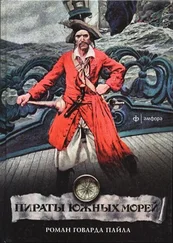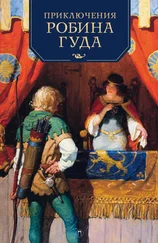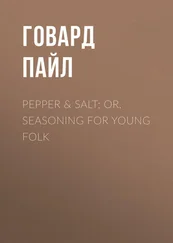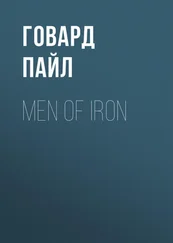Говард Пайл - Within the Capes
Здесь есть возможность читать онлайн «Говард Пайл - Within the Capes» — ознакомительный отрывок электронной книги совершенно бесплатно, а после прочтения отрывка купить полную версию. В некоторых случаях можно слушать аудио, скачать через торрент в формате fb2 и присутствует краткое содержание. Жанр: foreign_antique, foreign_prose, на английском языке. Описание произведения, (предисловие) а так же отзывы посетителей доступны на портале библиотеки ЛибКат.
- Название:Within the Capes
- Автор:
- Жанр:
- Год:неизвестен
- ISBN:нет данных
- Рейтинг книги:5 / 5. Голосов: 1
-
Избранное:Добавить в избранное
- Отзывы:
-
Ваша оценка:
- 100
- 1
- 2
- 3
- 4
- 5
Within the Capes: краткое содержание, описание и аннотация
Предлагаем к чтению аннотацию, описание, краткое содержание или предисловие (зависит от того, что написал сам автор книги «Within the Capes»). Если вы не нашли необходимую информацию о книге — напишите в комментариях, мы постараемся отыскать её.
Within the Capes — читать онлайн ознакомительный отрывок
Ниже представлен текст книги, разбитый по страницам. Система сохранения места последней прочитанной страницы, позволяет с удобством читать онлайн бесплатно книгу «Within the Capes», без необходимости каждый раз заново искать на чём Вы остановились. Поставьте закладку, и сможете в любой момент перейти на страницу, на которой закончили чтение.
Интервал:
Закладка:
Howard Pyle
Within the Capes
PART I
CHAPTER I
CERTAIN members of Captain Tom Granger’s family have asked him, time and time again, why he did not sit down and write an account of those things which happened to him during a certain period of his life.
These happenings, all agree, are of a nature such as rarely fall to the lot of any man, crowding, as they did, one upon the heels of another, so that in two years’ time more happened to Tom Granger than happens to most men in a lifetime.
But Captain Granger has always shaken his head, and has answered that he was no writer and that a pen never did fit nicely betwixt his stiff fingers, as Mrs. Granger can tell them if they will ask her.
Beside this, he has hitherto had his affairs to look after, so that he may be able to leave behind him enough of the world’s goods to help his children and his children’s children easily along the road that he himself found not over smooth.
Now, however, he has given up much of his business to the care of his sons, who are mostly men well on in years, with families of their own, and who are discreet in the management of things. Therefore, having much more leisure time upon his hands than he has ever had in his life before, he will undertake to do as he has been asked, and to write a plain, straightforward story of his adventures. This he does with much diffidence, for, as I have said, he is no very good hand with the pen and the ink-horn. The story may be told in a rough way; nevertheless, I believe that many of those that read it will think well of it, having a certain tenderness for the writer thereof.
I am furthermore inclined to thus take upon myself the transcribing of the history of these things, because that Captain Tom Granger is coming fast to the ending of his life; and, though his latter days may be warm and sunny, like a late Indian summer, there are those yet to come in a few years who will not have the chance to hear of these things from his own lips. Therefore, as there has been much gossip about certain adventures that befell him, I would rather that they should learn of them under mine own hand than from hearsay. Truly, things get monstrously twisted in passing from mouth to mouth, and by the time that the story of these doings has passed down through three or four generations, the old gentleman might be turned into a pirate and a murderer, for all that I know, which would be a pretty state of affairs.
I do not know how it was that Tom Granger got the title of captain, for the highest grade that he ever reached was that of second mate of the Privateersman Nancy Hazlewood . However, as no one in Eastcaster ever had held so high a grade of the like nature up to that time, I suppose that the wonder really is that he was not called commodore, or even admiral.
Any one in Eastcaster can tell you where he lives; it is the large white house, with the porch in front, that stands well back from the road under the shadow of three broad maple trees. It is just across the way from the Hicksite Meeting-house. You can easily tell it as you go along the street, because there is a ship in full sail chiseled in relief on the stone gate-post, which is very well done indeed, and was carved by William Johnson, the stone-cutter, under mine own direction and supervision.
I will say here, that Captain Granger will be always glad to see you if, at any time, you should chance to come to Eastcaster. If he is not at home, you will be likely to find him playing chequers or backgammon at the Black Horse Tavern, just around the corner of Market street, and nearly opposite to the court-house.
However, that is neither here nor there, and I find that I am wandering from the point. But you must excuse and overlook that, bearing in mind that it is the way of an old man, who has done a great deal of talking in his day. I thank goodness that I am old enough now to know better than to gossip and talk as much as I used to do, and am rather silent than otherwise.
Nevertheless, I promise now that I will heave ahead with my yarn, though it may be that I will leave some things untold that you would like to hear, being, as I said, no great talker, in which case you must come to Eastcaster, and then I will tell you anything that you may want to know.
I will not enter into a long yarn concerning what happened in Tom Granger’s life before the year 1812, for though such a yarn would hold within it many concerns of interest, it is not for the sake of relating them that I have thus taken my pen betwixt my fingers. It was late in the spring of that year (1812) when he returned home after a three years’ cruise to the East Indies.
I think that there is no joy in all the world like that of getting home again after a long voyage, such as this had been. I do not know but that it repays one for all the sorrow and pain of leave-taking, and for the home-sickness that follows thereon. Even such changes as have happened betwixt the going and returning do not seem amiss, provided that they have not brought grief and trouble with them.
The changes that had occurred since Tom’s departure in the summer of 1809 had brought no sadness with them. When he had gone away, he had left his sisters, Susan and Mary, as young girls; the former sixteen and the latter fifteen years old. They had now grown into a pair of fine young women and were chits no longer. This was the first and greatest change that struck Tom, so you may see how little had happened. The folks were already beginning to tease Susan about Will Gaines, who had just returned from Philadelphia, where he had been studying law, and had set up an office for himself in Eastcaster.
The next day was Sunday, or First-day, as we call it in Quaker neighborhoods, and as all of the family were going to meeting, Tom put on his best toggery to go with them.
It was a beautiful, bright clear day, and as Tom stood on the porch waiting for Henry, who was to go with him, his heart swelled within him with the love of home. It seemed sweet to him to look on the young leaves of the trees, the green meadowlands and the richness of growing wheat, after seeing nothing for months but a wide stretch of troubled waters; it was good to feel the balmy blowing of a breeze that was not salt; to hear the singing of the robin and the chattering of the wren; the crowing of the cocks and the lowing of the cattle, and not to have in his ears the everlasting washing and gurgling of the water alongside.
The folks use to ride to meeting on horseback in the old times, the women behind the men on pillion saddles. But Tom was a sailor, and consequently no good figure on horseback, so he and Henry, the youngest, set off ahead of the rest to foot it, for the homestead farm was only a mile and a half from Eastcaster meeting.
The meeting-house looked very pleasant where it stood, back from the street under the shadow of the two great elms in front of it. The old meeting-house was standing then, for they did not tear it down to make room for the new building until ’32. The present building is larger than the old one was, and is, no doubt, lighter and better, and more comfortable in many ways; but for all that, I have never liked it as well as the old black and red brick meeting-house, with its high roof running up to a point from all four corners and topped with something that looked like a belfry, though it had no bell in it, of course.
In the old days, as now, when the weather was warm and bright and pleasant, the men used to stand for a while around the door of their side of the meeting, talking and chatting together before they went into the building. Such a group was standing on the grass under the shadow of the elm trees as Tom and his brother Henry came up the steps that led into the meeting-house yard.
Читать дальшеИнтервал:
Закладка:
Похожие книги на «Within the Capes»
Представляем Вашему вниманию похожие книги на «Within the Capes» списком для выбора. Мы отобрали схожую по названию и смыслу литературу в надежде предоставить читателям больше вариантов отыскать новые, интересные, ещё непрочитанные произведения.
Обсуждение, отзывы о книге «Within the Capes» и просто собственные мнения читателей. Оставьте ваши комментарии, напишите, что Вы думаете о произведении, его смысле или главных героях. Укажите что конкретно понравилось, а что нет, и почему Вы так считаете.












